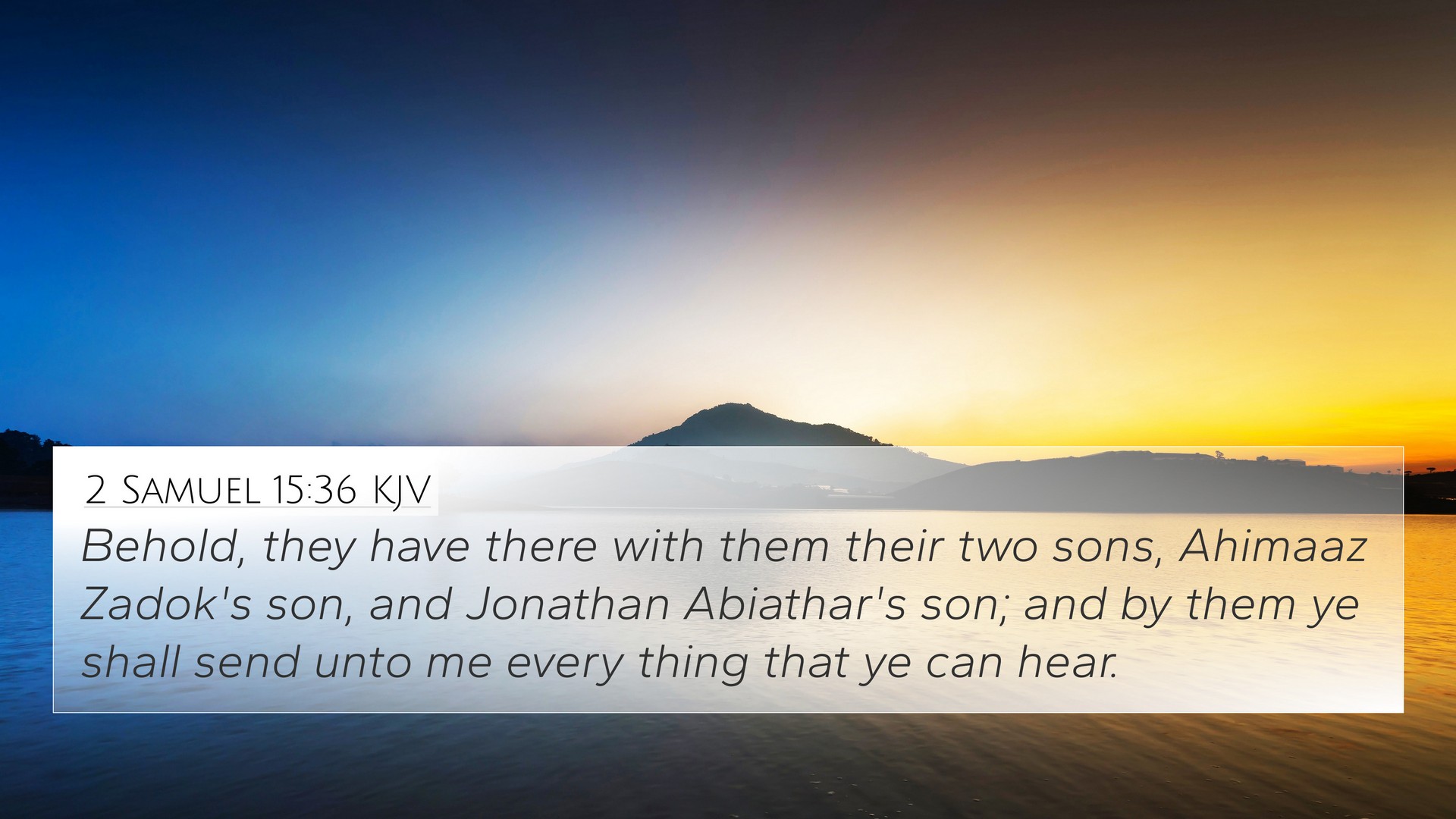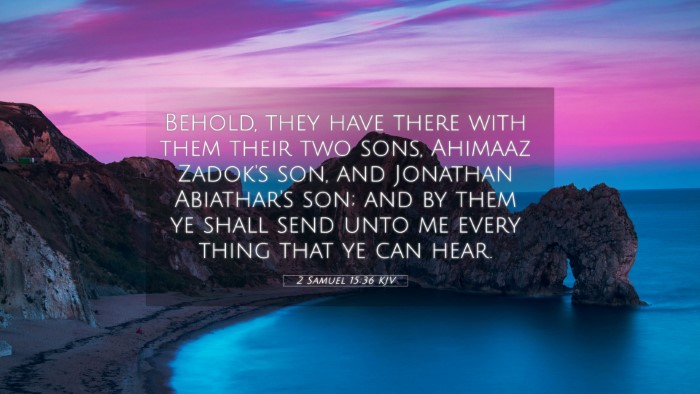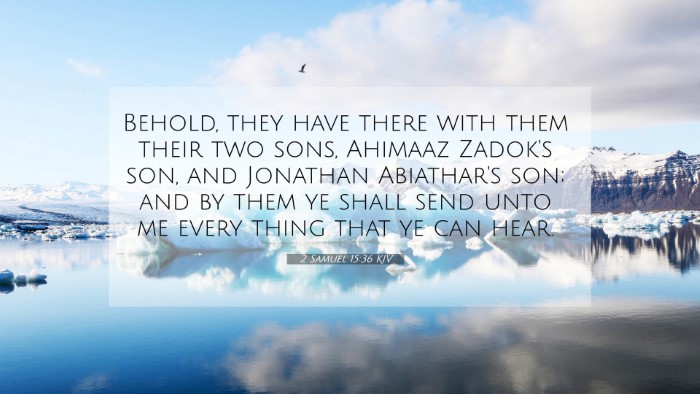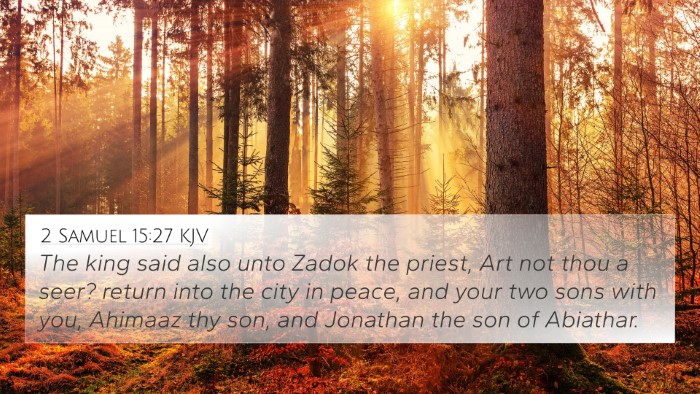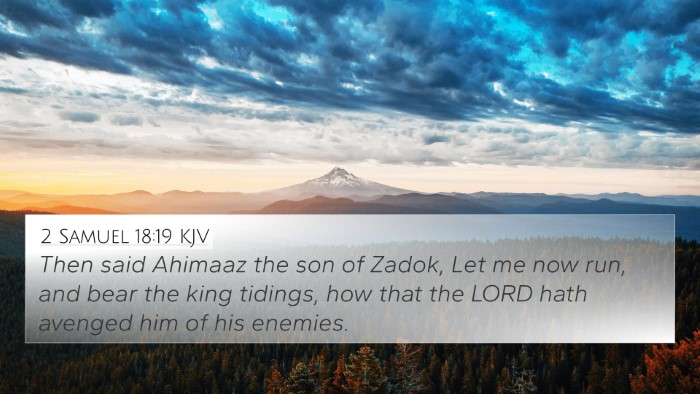Understanding 2 Samuel 15:36
In 2 Samuel 15:36, a critical moment unfolds as Ahithophel, King David's counselor, is described as a crucial figure during Absalom's rebellion. This verse emphasizes the themes of loyalty, betrayal, and the complexities of political alliances. To better understand this verse, we can analyze it alongside insights from public domain commentaries and explore its connections to other scripture throughout the Bible.
Verse Context and Summary
2 Samuel 15:36 states: "And Zadok, and Abiathar, were with him; and they carried the ark of God, and they went up the way of the mount of Olives; and wept as they went up; and had their heads covered, and they went barefoot."
This passage takes place during a turbulent time in David's reign when his son Absalom sought to overthrow him. The presence of Zadok and Abiathar alongside the Ark signifies loyalty to David but also underscores the emotional toll of the conflict as they mourn for the current state of affairs.
Commentary Insights
-
Matthew Henry: Henry emphasizes the emotional gravity of the moment, noting that the actions of Zadok and Abiathar reflect their grief and dedication to David. Their head coverings and bare feet depict mourning, illustrating the seriousness of the situation and the weight of their loyalty to the king.
-
Albert Barnes: Barnes focuses on the symbolism of the Ark of God, underscoring its importance as a representation of God's divine presence among His people. This rallying around the Ark highlights the spiritual nature of their struggle as they physically and spiritually support David during the crisis.
-
Adam Clarke: Clarke interprets the moral dilemmas present in this verse, pondering why Ahithophel, once a trusted advisor to David, became a traitor. He evaluates the political maneuverings at play and the ramifications of disloyalty within the context of leadership and governance.
Thematic Connections
The themes in 2 Samuel 15:36 resonate with numerous other biblical passages. Understanding these connections can deepen our comprehension of the events surrounding David's kingship and the broader biblical narrative.
Cross References
- 1 Samuel 10:5: The significance of the Ark and its association with God's presence is established early in Israel's history.
- 2 Samuel 15:12: Ahithophel's betrayal is foreshadowed by the growing unrest in Israel.
- 2 Samuel 16:23: The wisdom of Ahithophel is highlighted, showing the critical nature of his counsel.
- Psalm 3:1-2: David’s lament during the uprising serves to illustrate his struggles and reliance on God amidst treachery.
- 2 Samuel 19:1-2: David’s mourning is echoed in later verses as he responds to Absalom’s death.
- 1 Kings 1:32-39: Connections to the Ark’s significance continue as Solomon ascends to the throne.
- Hebrews 9:4: The Ark of the Covenant’s importance and its role in the New Covenant are explored, linking Old Testament themes with New Testament teachings.
Bible Verse Analysis
The analysis of 2 Samuel 15:36 through the lens of comparative Bible studies allows for a robust examination of the text. Themes of leadership, loyalty, and divine presence are not only central in this passage but recur throughout the canon.
Comparative Examination
By systematically linking Bible scriptures, one can observe how the events in 2 Samuel reflect God’s overarching narrative throughout both the Old and New Testaments. The deeper understanding highlights the importance of faith amid adversity, as portrayed by David and his associates.
Tools for Bible Cross-Referencing
Utilizing tools such as a Bible concordance or a Bible cross-reference guide can facilitate deeper insight into passages like 2 Samuel 15:36. These resources help identify connections and allow for a thematic study of characters and events.
How to Use Bible Cross-References
When studying a particular Bible verse, consider the following:
- Identify key phrases or themes within the verse.
- Look up related scriptures in a concordance.
- Explore commentaries that provide insights and historical context.
- Reflect on the thematic implications of cross-referenced verses.
Conclusion
Ultimately, 2 Samuel 15:36 gives profound insight into the emotional and spiritual dimensions of David's leadership during a time of crisis. By exploring the verse through public domain commentaries and cross-referencing scripture, one can appreciate its significance in the broader narrative of the Bible. This approach not only enhances understanding but also encourages deeper reflection on the themes of loyalty, betrayal, and the steadfastness of God's presence throughout the scripture.
